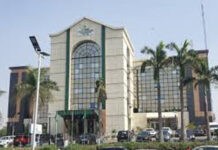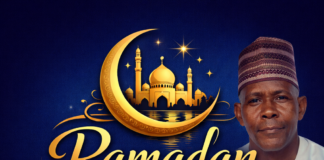By Ishola Balogun
Muharram is the first month of the Hijri calendar and thus marks the beginning of the Islamic year. The Prophet Muhammad (saw) referred to it as ‘the Sacred Month of Allah’ – and is thus a highly blessed month.
It is one of the four sacred months, and its special importance is indicated by its name. The word ‘Muharram’ literally means ‘forbidden’ – i.e. it is so sacred that certain actions become forbidden during it, as they would violate its sanctity. Both the month of the Muharram and Allah’s House (Al-Masjid Al-Haram) derive their names from the same Arabic root word; both are sacred spaces in which every deed, good or bad, weighs heavier on the scales.
Allah says in the Quran: “‘Indeed, the number of months with Allah is twelve [lunar] months in the register of Allah [from] the day He created the heavens and the earth; of these, four are sacred. That is the correct religion, so do not wrong yourselves during them…’ (Qur’an, 9:36)
Ibn Katheer (r.a) explains, ‘Allah has chosen elites from His creation: from among the angels He chose Messengers, from among mankind He chose Messengers, from among speech He chose remembrance of Him (dhikr), from among spaces on earth He chose the mosques, from among the months He chose Ramadan and the sacred months…So, venerate that which has been chosen by Allah, for people of understanding and wisdom respect that which has been chosen by Him’. (Tafseer Ibn Katheer)
Since it is one of the holy months as chosen by Allah, we should have to observe it so. These sacred months are Rajab, Dhul-Qa’dah and Dhul-Hijjah and Muharram. Allah commands us not to ‘wrong ourselves’ during this sacred months, which essentially means to ensure we have pure intentions and righteous behaviour and don’t fall into sin. Note that the place of Ramadan is different and should not be confused. Allah declared Ramadan as a fasting month and a month in which the Quran was revealed, just as He chose to elevates a night therein which is described as better than 1000 months. But we are not talking about Ramadan now, but about the first Islamic month – Muharram.
Historically, one of the practical consequences of Dhul-Qa’dah, Dhul-Hijjah and Muharram being sacred was that pilgrims would be allowed to perform Hajj safely without worrying about banditry or war. Fighting was forbidden during Dhul-Qa’dah, when they would be travelling to make the Hajj; Dhul-Hijjah, when they would be performing Hajj in Makkah and its surroundings; and Muharram, when they would be returning home from Hajj. This standard was upheld by the Arabs in pre-Islamic times, and Allah confirms it in the Qur’an.
Rajab, on the other hand, is the seventh month of the Hijri calendar and stands alone as a sacred month. Historically, this was to allow people to perform ‘Umrah in Rajab if they wanted to.
In Muharram it is highly recommended to fast as much as possible during Muharram (though fasting the whole month is reserved for Ramadan only). The Messenger of Allah (saw) said, ‘The best fasting after Ramadan is the Sacred Month of Allah (Muharram)…’ (Muslim)
The sanctity of Muharram was so established that even the Quraysh in the days of Jahiliyah (ignorance) used to fast on certain days. One such day is the Day of ‘Ashura (the 10th of Muharram), which celebrates Allah (swt) freeing Prophet Musa (as) and his people from the bonds of Pharaoh:
The Messenger of Allah (saw) said that fasting on the day of ‘Ashura , ‘expiates the minor sins of the past year’ (Muslim). It is, therefore, highly recommended to fast on this day.
The Prophet (saw) also advised us to also fast on the 9th and/or 11th of Muharram in order to differentiate between his Ummah and the People of the Book and as we know, following his Sunnah contains immense blessing.
Give regular Sadaqah. Muharram is the beginning of the Islamic New Year, so it’s the perfect time to make resolutions and establish good habits that you can reap the rewards of all-year round.
There are some Muslims who prefer to appropriate their Zakat in the begining of the Islamic month, while a good number of Muslims also choose to do that during noble month of Ramadan.
Although there is no specific recommendation to pay your Zakat in Muharram, during the times of the Prophet (saw), Zakat was collected from the Ummah on the 1st of Muharram. The increased reward available for honouring the times of the year favoured by Allah is one of the reasons why many Muslims around the world still choose to give their Zakat in Muharram or Ramadan.
It is also appropriate if you prefer to spread out your Zakat payments over the whole year.
Sponsoring an orphan or widow or the less privileged in the society is another great way to spread our Zakat or better still give it to Zakat foundations in your area for onward distribution.
Truly, most of Islamic projects are Zakat-eligible. Recently, the Island Muslim Council was formed with a view to source funds for the building and establishing of beffiting Muslim Cemetery. It also sought to build Entrepreneurship Center for the youths among others.
In Islam, Muslims are always encouraged to engage in deeds that carry more weight at all times so as to get more rewards and shun the least sin which attracts even least punishment. This means we should be extra-careful when it comes to how we act, whether in our relationships, at work, in our worship, in our business dealings with others. With the right intention, every single action can become an opportunity for reward!
One star action we can do is to engage ourself in fasting. Fast especially during the Ashura day which is the tenth of the month even if you can not fast most days of the month.
Seek forgiveness. Since sins are heavier in Muharram, you should ask for forgiveness as often as possible during this month.
Read more Qur’an. This action is better at all times as it illuminates the heart, and offer guidance in your daily actions.
These actions aren’t specific to Muharram, but they are highly recommended, and it makes sense to increase them during this blessed month!






















